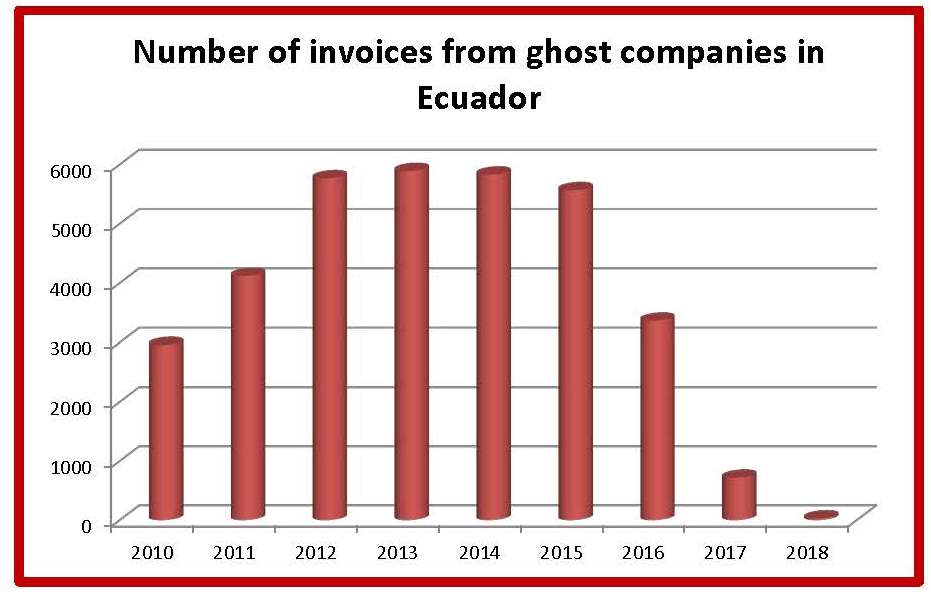At least seven Chinese companies the Ecuadorean government hired for public works projects in the construction, mining, telecommunications, and oil exploitation sectors made payments to companies the Ecuadorean Internal Revenue Service (SRI, in Spanish) considers shell corporations.
This information is the result of an investigation by Ecuadorean daily El Universo, which compared SRI’s shell corporation database from April to tax returns of Chinese companies the country hired between 2010-2018.
According to Jorge Rodríguez, an Ecuadorean economist and a representative of the country’s National Anti-corruption Commission, the use of shell corporations is long-standing in Ecuador. He said these companies are usually hired to launder money, simulate expenses, artificially lower their earnings, and pay kickbacks to authorities for acts of corruption.
“The problem started in the 1990s, when banks tried to move the sucre and the dollar, so businessmen built shell corporations in the names of their drivers or assistants to launder cash and gain advantages over the exchange rates. That practice was reborn in 2007, as a way to pay kickbacks for corruption. Shell companies have fake receipts to collect money from public funds. They invoice, collect the funds, and then distribute it,” Rodríguez told Diálogo. “They use that same scheme to launder money that must go through the banks; they open accounts under the names of fake companies. It’s a great business because they artificially decrease their earnings, but in reality they channel all public funds to their pockets.”
Chinese Companies
El Universo’s investigation revealed that seven Chinese companies hired by the Ecuadorean government reported charges for supposed transactions with 84 shell corporations. Those amounted to close to $22 million.
The implicated Chinese companies include China CAMC Engineering, China International Water & Electric, China Gezhouba Group, Harbin Electric International, China National Electric Engineering, China Electronics Import & Export, and two Ecuadorean branches of Sinohydro. The most commonly used shell corporations were Construestilo S.A., Comexito S.A., Highstrategy S.A., Gotoconstru S.A., and Divinacompany S.A., according to El Universo.
“The Chinese learn quickly when it’s about corruption; we have many companies from that country that used corporations built specifically to steal money from the government. That’s how they concealed many companies. The signed contracts included restrictive clauses on access to information, a situation that favors corruption because it made it impossible for civil society to triangulate the information,” said Rodríguez.
Transparency in contracting
According to a June 6 report on the online news daily Ecuador en Vivo, Ecuador signed 74 contracts with Chinese companies between 2008 and 2018, for a total of about $8 billion. “However, what’s disturbing about the Asian country’s increased investments, which only amounted to about $7 million in 2007, is the shady contracting, financing terms, delivery terms, and even the quality and material specification,” says the news site.

In a November 2018 inspection of Coca Codo Sinclair, the country’s largest hydroelectric plant, Ecuadorean authorities found 7,648 cracks in the distributors that inject water to the turbines and structural damages worth more than $1 billion. Chinese Company Sinohydro built the massive work in 2016.
Ecuador en Vivo adds that “there are similar cases in other countries, especially the Bolivarian axis: Bolivia, Venezuela, Nicaragua, and Cuba. Chinese Company China CAMC Engineering, which according to its website conducts industrial, hydraulic, electric, and transportation engineering projects, has been under investigation by Bolivia’s Assembly, Comptroller, and Public Ministry for the last two years, and has several restrictions to information access.”
Ecuador’s SRI began to verify the data its researchers provided. “That’s how it uncovered which companies were built specifically for that purpose and labeled those that had billed the government but never reported the earnings in their tax returns as shell companies,” Rodríguez said. “These cases were uncovered as a result of the government’s detailed data inspection.”
Chinese businesses have a foot in Ecuador’s most important development areas. “All these contracts were covert, and now the use of shell companies becomes clear. Chinese businesses don’t seem to portray any ethical principles, and corrupt authorities will always be there to help and make money,” Rodríguez concluded. “It’s not fair that businesses hired to improve the country’s conditions conduct shady financial moves to swindle the government. We must demand transparency, regardless of whether these are Chinese or Ecuadorean businesses, we must be aware of how our money is used.”









